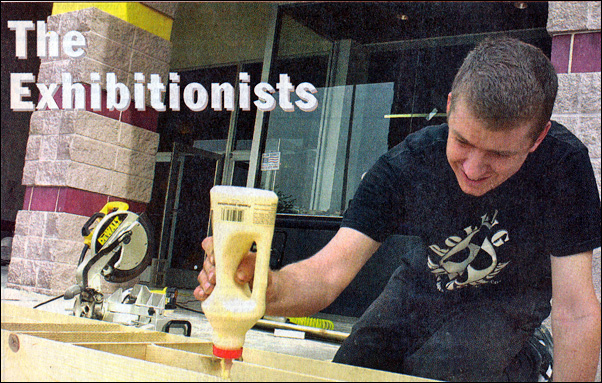Photo by Christina Tambakakis. Originally published on April 22, 2003 in The Daily Texan. With yesterday’s announcement that the Alamo Drafthouse will break ground in New York, one of the first outside of Texas, this article penned when League was working on his third theater in Austin might be of interest. Since it was written, the Dobie Theater went under in 2010 and Paul Beutel, the mastermind behind the Paramount Theater’s film programming, moved on to become the managing director at the Long Center for the Performing Arts.
Yes, that is a wine rank that Alamo Drafthouse owner Tim League is sanding for his movie theater.
If you can’t imagine going to the movies without a large tub of popcorn and a super-size Coke in front of you, you haven’t been to one of Austin’s Alamo Drafthouses. Not only do his theaters sell beer and wine, they serve dinner as well. The concept has been so successful that League and his wife Karrie are about to open a third Drafthouse in Austin at Lakecreek on May 16th and a fourth in Houston days later.
Getting his hands dirty with the rest of his staff is typical for this hardworking entrepreneur in an atypical venue in a city that welcomes the ingeniously quirky as an integral part of its unique cultural landscape.
“I think that if you go 20 years in the future and they talk about the most important film fate that happened in Austin, it’ll be the creation of the Alamo Drafthouse,” said Harry Knowles, of Ain’t It Cool News who frequently collaborates with League on regional film premieres. “I fully believe that because, right now, they’re beginning to franchise, and we’re going to have a major theatrical franchise birthed out of Austin, and what Tim has always talked about is to never leave the fact that we’re in Austin.”
When League opens up the Lakecreek, the theater will continue a tradition of independent movie theaters in Austin, each with an ambience tailored to fit a different audience. Besides League, fate has brought two other theatrical programming geniuses to Austin over the years including Scott Dinger, the former owner of the Dobie, and Paul Beutel, the director of programming for the Paramount Theater. Together, both of whom have helped create a film culture in Austin unlike anywhere else, with that uniqueness spill over to the venues themselves.
“’Dancer’ had the prime slot at the opening night of SXSW in 1998 and then again played the Paramount during the festival’s closing night,” recalled Tim McCanlies, director of “Dancer, Texas, Pop. 81” and the upcoming film “Secondhand Lions.” “At the second showing, several of the bats who seem to live in the Paramount decided to fly around in the auditorium and dive bomb the screen and reenact the final space battle from ‘Star Wars.’ Only in Austin.”
But it wasn’t only the bats that were allowed to fly in Austin’s theaters over the years. The common thread amongst the city’s indie theaters was to allow a place for local filmmakers to show their films who may not have gotten a break otherwise.
“In Austin, it’s all about people,” said Louis Black, editor of The Austin Chronicle. “Scott Dinger, one of the unsung heroes of the Austin film scene, was very friendly to local film and was always taking chances [at the Dobie], so when Rick [Linklater] and Lee [Daniel] decide to show some of their experimental shorts, which is going to lead to the Austin Film Society, they go to Scott and Scott says ‘yes.’ When Rick finishes ‘Slacker’ and asks if he can show it, Scott says ‘yes.’”
There was a time when Dinger wasn’t even sure he would say “yes” to buying the theater.
“I just happened to see the marquee that said, ‘Closed for the Holidays,’” said Dinger. “It was around Christmas, and I remember thinking about that. Weeks later, I drove by again and I saw the same sign up and the holidays were over, and something just clicked.”
The next thing he knew, Dinger had bought himself something much too big to put under the tree and ran the theater until 1998 when he gave up ownership to run the Austin Gay and Lesbian Film Festival. But before he did, “Slacker” played for 10 consecutive weeks of sold-out screenings in 1991 and was ultimately picked up for distribution by Orion Classics (by UT grad and future Sony Pictures Classics co-chief Michael Barker), eventually becoming a symbol for the independent film movement in America.
“It’s real unusual, but it’s really exhilarating when that happens,” Dinger said of his experience with “Slacker.” “It’s difficult today to make that happen. The Dobie was lucky enough to be in a situation where we could take some chances because there were a lot of movies where you take that chance and it doesn’t happen.”
In fact, Dinger’s success with “Slacker” had an unexpectedly negative side effect. Other filmmakers assumed he could do the same for their films. He had to tell them, “I didn’t do it. I only was able to create the opportunity to have a theater that could take the chance and that’s really what it was. So a lot of people thought it’s the theater, and no, it’s not the theater. It has to be the film, and all you can do is give the film its opportunity. And more times than not, of course, it didn’t happen anywhere close to that scale.”
When Landmark Theaters, the arthouse chain, wanted to buy the theater from Dinger in 1998, the opportunity to show independent films by local filmmakers diminished, but as Harry Knowles notes, the end of one good thing led to the beginning of another.
“I kind of hate to see that the Dobie got out of Scott Dinger’s hands,” Knowles said. “And now, it’s Landmark. Of course, it’s always hard for those guys to get the bookings that they need to survive and that’s why the Dobie went the way it did. When Tim came to Austin, this town wound up with significant film exhibition in terms of innovation and importance.”
In fact, League would help filmmakers in much the same way Dinger did.
“Austin is the coolest place in the world for many reasons,” said Alex Holdridge, whose debut film “Wrong Numbers” played to sold-out screenings at the Drafthouse Downtown. “Basically, I dropped off a tape to Tim and Karrie and it was like ‘Hey, we made this little low budget movie.’ And we didn’t have any plans. I had no money. I wasn’t funded by my parents or anything. That was just credit cards, working, people pitching in for free, helping. So after that whole film festival thing, that was it for me.”
Instead, of a dead end, Holdridge scored a deal to help remake “Wrong Numbers” on a larger scale for the Sony-based Red Wagon Films. [Update: Unfortunately, the film’s similarity to “Superbad,” which came later, would hold it up in development.]
“Here, it you actually do make a movie,” Holdridge said, “Shit, you can show it and people will show up. I don’t know why. But people here are really passionate about movies.”
With the same artistry and ingenuity as the filmmakers who have also found inspiration near Lake Travis, League has been redefining the theatrical experience for Austin audiences for the past six years and with another location opening up in Houston, he’s set to redefine it for the rest of Texas. Not only does he serve food and drinks during the films, but he literally takes his act out on the road with the Rolling Roadshow, complete with a portable screen, which will celebrate its second anniversary May 3rd with a screening of “Deliverance” and a barbecue by the side of the Colorado River, just as it all began. He has shown “Jaws” in the middle of Lake Travis and “The Goonies” inside Longhorn Caverns.
But besides going the distance for film geeks, League, a guy who once worked for Shell Oil has come a long way from his first theater in Bakersfield, Calif., to become one of the most admired members of the film community in Austin, perfecting the Drafthouse formula along the way.
“It was more of an arthouse theater and live music venue in Bakersfield,” League said of his first theater. “That’s when we learned the business. While we were operating that, we experimented with things like matching up food to movies and doing special events, but it was more or less a failure. We ran it with just the two of us, without any employees for two years in Bakersfield. Then we had the opportunity to sell the building to a church and at that time, we’d figured we’d cut our losses and move somewhere else and start from scratch based on what we had learned. That’s when we came to Austin.”
The rest is history, though while League is making it, Paul Beutel at the grand old Paramount Theater is preserving it. A sucker for “Casablanca” who went above and beyond the call of duty to find a rare Todd-AO film print of “Oklahoma” just so he could show it at its intended speed of 30 frames per second (the typical film runs 24 fps), Beutel has been the theater’s film programmer since 1985. It’s a job that he seemed destined for after covering the theater’s restoration during the early 1980s as a film reporter for the Austin American-Statesman.
“When I came up here to go to the University of Texas,” Beutel said, “My first night in Austin, I came to the Paramount, I saw Butch Cassidy and the Sundance Kid when it was still a first-run movie house and thought, ‘Wow, this is a great theater like the ones I used to go to in Houston, albeit smaller because those were all 3000-seat theaters. They were huge, so when I got the job here, it was a dream come true.”
In the years since, Beutel has done the same for Austin film lovers, reestablishing a summer film series that includes classics ranging from “The Maltese Falcon” to “Sixteen Candles,” handling regional premieres of films like “Miss Congeniality” and “Spy Kids” and sneaking special screenings in between the Paramount’s already overflowing schedule of live performances and stage productions.
“There are several things that are important to me about it as a film buff,” Beutel said. “The first thing we want to do is recreate the experience the audience had when they first saw the film as closely as we can. In my mind, if we are in effect acting as a film museum, which I think we are, we also have a responsibility to represent various eras and styles of film through the ages.”
The people behind the independent theaters of Austin have established a legacy of their own to go along with the films they present. Besides the opening the a new Drafthouse, Austin audiences will have even more to celebrate in May when the corporately owned Regal Cinemas opens the reincarnated Arbor arthouse at Great Hills. Once again, it will be under the management of Kevin Prewitt, a person whose vision was in keeping with Austin’s independent spirit before its previous residence became a Cheesecake Factory at the Arboretum Mall in 2002. He along with League, Dinger and Beutel have brought about a diversity of film experiences in Austin that’s reflective of the culture.
“It’s one of our priorities to be supportive of the film community here and do basically whatever we can as a venue,” said League.




